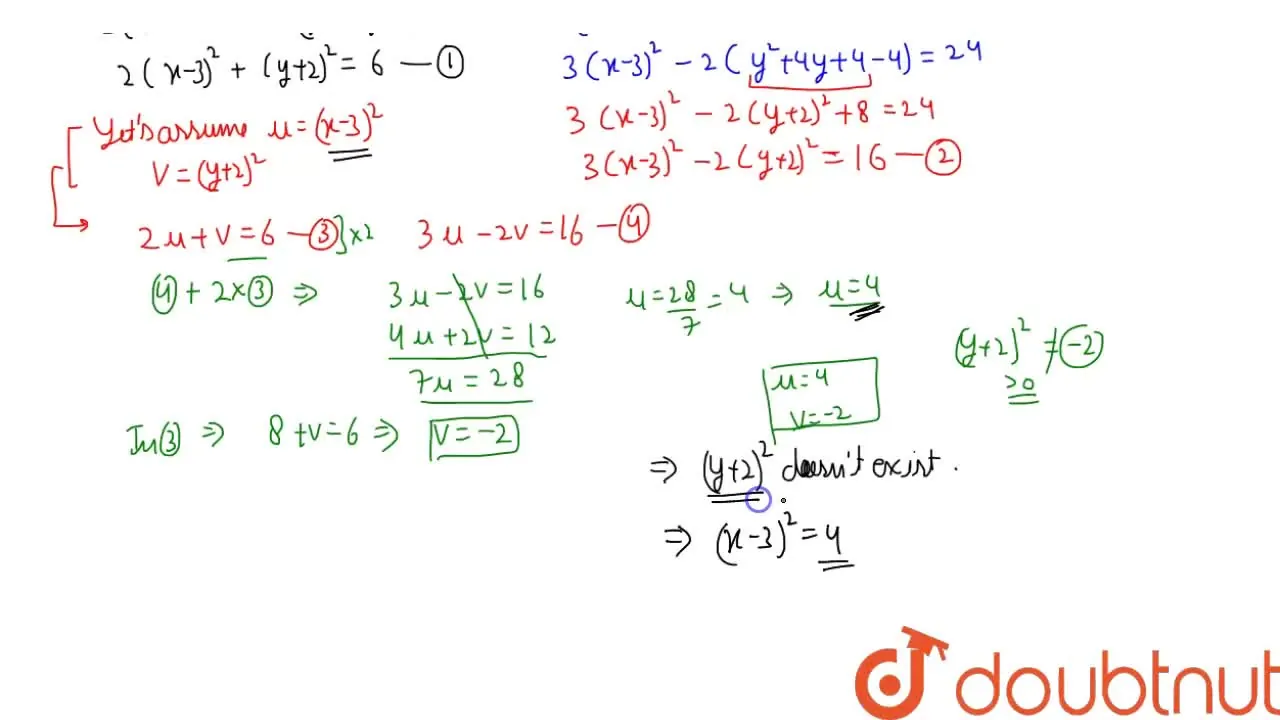Solve the following equations for and :
and .
When it is said that solve for x and y then we have to find such values of x and y which satisfy both the equations. Similarly if we are asked that solve for and , then we have to find the value of and which satisfy the above two equations.
First take the first equation as
implies
implies
Now, take the second equation as
Let = u and .
So, equations (1) and (2) become
2u + v = 6 ....(3)
and 3u - 2v = 16 ....(4)
Multiplying equation (3) by 2, we get
4u + 2v = 12 ....(5)
Adding equations (5) and (4), we get
4u + 2v = 12
Putting u = 4 in equation (3), we get
2(4) + v = 6 implies v = - 2 implies
But square of any real number cannot be negative.
So, and does not exist.
Related Playlists
- BOOK - NAGEEN PRAKASHAN ENGLISHCHAPTER - LINEAR EQUATIONS IN TWO VARIABLES EXERCISE - Exercise 3a18videos
LINEAR EQUATIONS IN TWO VARIABLES
- BOOK - NAGEEN PRAKASHAN ENGLISHCHAPTER - LINEAR EQUATIONS IN TWO VARIABLES EXERCISE - Exercise 3A8videos
LINEAR EQUATIONS IN TWO VARIABLES
- BOOK - NAGEEN PRAKASHAN ENGLISHCHAPTER - INTRODUCTION TO TRIGONOMETRYEXERCISE - Revision Exercise Long Answer Questions5videos
INTRODUCTION TO TRIGONOMETRY
- BOOK - NAGEEN PRAKASHAN ENGLISHCHAPTER - POLYNOMIALSEXERCISE - Revision Exercise Long Answer Questions4videos
POLYNOMIALS
Similar Questions
Solve for (x−1)2 and (y+3)2,
2x2−5y2−x−27y−26=3(x+y+5)
and 4x2−3y2−2xy+2x−32y−16=(x−y+4)2.View SolutionSolve the following differential equations: (x2+3xy+y2)dx−x2dy=0
View SolutionSolve the given equations graphically.
3x−2y=4 and 5x−2y=0View SolutionSolve the following system of equations : 2x−3y+13=0; 3x−2y+12=0
View SolutionSolve the following differential equations: (x2+y2)dydx=8x2−3xy+2y2
View SolutionSolve the following equations for X and Y :
2X−Y=[3−30332],2Y+X=[415−14−4]View SolutionSolve the following differential equations: (2x2y+y3^)dx+(xy2−3x3)dy=0
View SolutionFind the equation of the circle whose diameter is the common chord of the circles
x2+y2+2x+3y+1=0andx2+y2+4x+3y+2=0View SolutionThe point from which the tangents to the circle x2+y2−4x−6y−16=0,3x2+3y2−18x+9y+6=0andx2+y2−8x−3y+24=0 are equal in length is : (A) (23,417) (B) (515,415) (C) (1716,415) (D) (54,23)
View SolutionThe distance of the point (1,-2) from the common chord of the circles
x2+y2−5x+4y−2=0 and x2+y2−2x+8y+3=0View Solution


